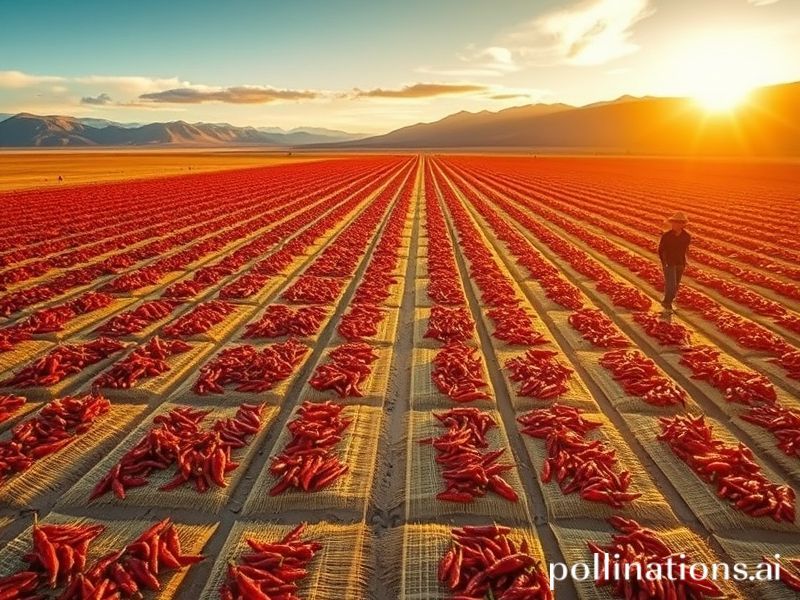Chile: The Planet’s Skinny Laboratory Where Copper, Coups and Constitutions Collide
Chile: The Skinny Country That Keeps Punching Above Its Weight
By Our Correspondent Who Still Can’t Pronounce “Aysén” Correctly
SANTIAGO—Look at a map and you’ll see a suicidal ribbon of land clinging to South America’s Pacific edge, 4,300 kilometers long and, in places, barely 90 kilometers wide—geography’s answer to a high-wire act without a safety net. This is Chile, the nation that taught the world how to spell “neoliberal experiment” before the word “experiment” still sounded cute. From the Atacama—so dry even bacteria phone in sick—to the Patagonian ice that’s melting faster than a crypto promise, Chile is the continent’s laboratory for whatever apocalyptic phase capitalism has queued up next.
Global Relevance, Tiny Waistline
Why should anyone beyond Santiago’s smog-ringed cafés care? Because Chile is the canary in everyone else’s copper mine. Literally. The country produces nearly 30 % of the planet’s red metal, the conductive backbone of your Tesla, your iPhone, and the wiring in those Russian drones currently redecorating Ukrainian suburbs. When Chilean miners sneeze, commodity traders in London reach for tissues stitched with dollar signs. Last month a single strike at Escondida sent copper futures into a pirouette that would make Bolshoi dancers blush, reminding us that global electrification is still held hostage by a handful of guys in hard hats 2,000 meters above sea level.
Constitutional Whac-A-Mole
Not content with cornering the metal market, Chile has spent the past four years playing constitutional roulette. In 2019, a modest thirty-peso subway fare hike detonated society’s accumulated grievances like an overcooked empanada in a microwave. The world watched live as 1.2 million citizens danced in Plaza Italia, demanding dignity, pensions that don’t requiere a Ouija board, and a new constitution to bury Pinochet’s lingering ghost.
Two referendums, countless Twitter threads, and one elected assembly packed with amateur TikTok lawyers later, the new Magna Carta was rejected by 62 % of voters. Turns out even progressive Chileans aren’t keen on a charter that reads like a Berkeley syllabus translated by Google. The takeaway for international spectators: if you promise utopia, deliver plumbing first. Meanwhile, the old constitution soldiers on, wrapped in duct tape and generational trauma—rather like the international rules-based order itself.
Water, or Lack Thereof
While Europe argues over lawn-watering bans, Chile is pioneering the dystopian future of H₂O capitalism. Private water rights—yes, you can own a glacier—mean avocados slurp more liquid than entire provinces. The result: farmers in Petorca truck in drinking water while British supermarkets boast “avocado toast” at brunch spots where patrons lecture on sustainability between sips of oat-milk flat whites. If you want a preview of climate apartheid, check out the tanker lorries rumbling through Chile’s valleys like something out of Mad Max: Gluten-Free Edition.
The lithium Two-step
Move over copper; the new white gold is lithium, the mood-stabilizing salt that doubles as battery Viagra. Chile sits atop half the world’s reserves, conveniently located underneath flamingo habitats. Beijing, Detroit, and Berlin are all panting for a slice, offering investment, extraction technology, and the occasional wink about environmental standards. President Boric’s leftist government vows nationalization, yet the stock prices of SQM and Albemarle remain as jumpy as a cat on a hot corrugated roof. Somewhere in the Atacama, a flamingo sheds a single tear that immediately evaporates—and gets counted as export revenue.
Migration & the Peruvian Pizza Effect
Once the region’s boringly stable oasis, Chile now absorbs hundreds of thousands of Venezuelans, Haitians, and Peruvians. The influx keeps wages low enough for the OECD to cheer, while Santiago’s skyline sprouts glass towers that look imported from a Dubai yard sale. Irony alert: Chileans who fled to Europe during the dictatorship now vote for politicians who tweet “Se acabó la zanganería” about newer arrivals. The global lesson: every country is willing to be a melting pot until the neighbors actually knock.
Bottom Line
Chile is the international order in miniature: resource-cursed, climate-stressed, politically bipolar, yet still obsessing over whether the wine export label looks sufficiently artisanal. If the 20th century was about superpowers, the 21st belongs to skinny countries with oversized commodity closets and identity crises. Watch Chile, because whatever happens here—constitutional meltdown, water riots, or the world’s first carbon-neutral coup—will soon be on tour in a hemisphere near you.







